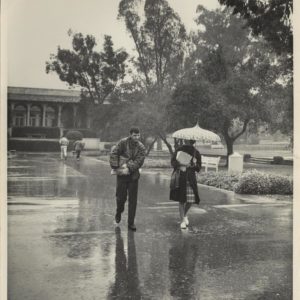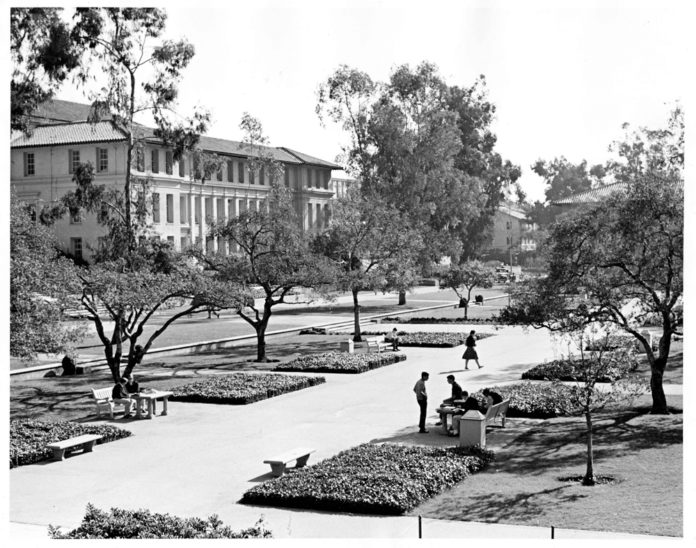In an email to the Occidental College community, President Harry J. Elam announced July 26 that the College would be formally ending the practice of legacy admissions. The announcement came roughly a month after the Supreme Court overturned its 2003 precedent that universities could consider applicants’ race in the admission process.
“Following the Supreme Court’s decision in June on race-conscious admissions, the College commenced a comprehensive review of admissions policies and practices to ensure they are compliant with the court’s decision and consistent with our own mission and values,” President Elam said in an email to The Occidental. “The formalization of our legacy admissions policy emerged from that review.”
According to Maricela L. Martinez, Vice President of Enrollment at Occidental, the decision to reevaluate legacy admissions in particular was also prompted by questions received by the Office of Admissions from concerned alumni.
“When the Supreme Court decision was released, as you might recall, very quickly the focus turned to legacy admissions,” Martinez said. “And we were getting questions from our own alumni about what is our policy on legacy admissions.”
These questions took Occidental from a school that had not been actively practicing legacy admission in the past few years to one that has a clear written policy declaring that legacy status will not be considered at any point in the admission process.
Occidental is not the only university that chose to review and discontinue legacy admissions following the June 23 ruling. Wesleyan University, Virginia Tech and the University of Minnesota also terminated their legacy admissions programs mid-July.
The decisions all came at a time when the future of legacy admissions had become tied up in the future of affirmative action — a policy which has historically taken an applicant’s racially diverse background into account in the admissions process.
When Students for Fair Admissions — the organization that filed the Supreme Court cases against Harvard University and the University of North Carolina — argued that eliminating legacy admissions would relieve the need for affirmative action, they drew a line connecting the two policies. According to Occidental education professor, Ronald Solórzano, this meant that once affirmative action was overturned, legacy admissions were quick to come under fire.
“Once [affirmative action] was cut off, the knee-jerk reaction was ‘okay, then we should cut off legacies too because they’re a fast track for mostly richer, whiter students to get into college,’” Solórzano said.
It’s a response that has reached far beyond higher academia. Following the ruling, President Biden urged the Department of Education to investigate the equity of legacy admissions and states are taking measures into their own hands. New York is currently seeking to ban legacy admissions at both private and public colleges throughout the state; Colorado was the first state to ban the practice of legacy admissions at its public colleges in 2021. Pennsylvania and California have promised to follow suit. A bill moving through the Massachusetts statehouse, on the other hand, would establish a tax for institutions that use legacy admissions, with revenue going to a trust fund for local community colleges.
Occidental, for its part, has moved ahead of such legislation, choosing to formally end a policy that is not in line with its mission to support and foster equity and justice, Elam said in his email.
What are legacy admissions?
Legacy admissions have become known as the practice of considering and placing weight on an applicant’s familial ties to the institution to which they are applying.
“Legacy admissions are typically associated with family lineage,” Solórzano said. “So if your parents or my parents went to Harvard or Princeton or Oxy, then their children would mark a box on the application saying that someone in their family, mainly parents, attended the school. And then the admissions committee would look at that, and then they would… assign some weight to that. Some assign more, some assign less.”
Legacy programs are valued because of their ability to foster a deep sense of pride and love in families who have witnessed a given institution bring generations of their relatives into adulthood. These emotional ties often benefit the colleges not only in the form of continued attendance but also in donations.
“Financially there’s a payoff and emotionally there’s a payoff that can span generations,” Solórzano said.
History of legacy admissions
According to Solórzano, the practice of legacy admissions can be traced back to the 1920s, when elite colleges — historically the purview of wealthy white Protestants — were facing the potential admission of Jewish and Catholic students. In order to preserve their traditional student body, the universities implemented a system to screen applicants and give preference to those with familial ties to the college. This of course benefited those same Protestants, whose families had been attending such institutions for generations, and worked against cultivating a diverse student body.
When it came to admitting students of color, legacy admissions — or what Solórzano calls “generational admissions tickets” — again became a tool to deny diverse applicants.
“The issue with it, of course, is that in the past people of color weren’t going to college,” Solórzano said. “They weren’t let in, right? The K-12 pipeline was not conducive nor preparatory for college admission. So mostly white folks, white middle to upper-class folks, benefited from legacy admissions because typically their parents went to college. So that gave them a leg up.”
Legacy admissions also affected the economic diversity of universities’ student bodies, according to Solórzano. More often than not, families with a history of attendance at such colleges were members of the middle or upper classes. By giving them preference over lower-income students, legacy admissions reinforced a cycle benefitting students of wealthy families that few others could break into.
As late as 1990, an enrollment task force at Occidental found that students who did not apply for financial aid noted that legacy status was one of the main factors in their choosing to attend, according to Occidental Library’s Special Collections. Students who applied for financial aid did not mention legacy status as influencing their decision.

According to Solórzano, legacy admissions quickly became a piece of a much larger puzzle. Along with testing and quotas — two admission programs that rely on persisting inequities — legacy admissions created an atmosphere in which privilege reinforced itself every generation.
Such policies did not only impact the diversity of who attended, they also had consequences for the diversity of what was taught, Solózano said.
“You didn’t have Black studies, you didn’t have Chicano studies,” Solózano said. “Even within the different disciplines, within psychology and philosophy, you didn’t really talk about the philosophy of Latino, Chicano, or Black [people]. Even today in some of our departments, not just at Oxy but throughout the country, we’re still reading a lot of dead white men’s philosophies and psychologies and so forth.”
Once affirmative action policies began to be passed in the 1960s and the Supreme Court set the precedent for considering race in college admissions in 2003, schools began to diversify their student bodies. Legacy admissions, however, did not go away. Instead, Solórzano said affirmative action and legacy admissions existed in a strange — and often contradictory — tandem.
“[With affirmative action] the idea was to give a leg up [to people of color], to diversify and to pretty much make up for past wrongdoings, right?” Solózano said. “Whereas legacy was just the opposite. Typically, legacies don’t diversify because there are not a lot of Black or Brown parents who went to college who can now bring their children up behind them.”
Legacy admissions at Occidental
There is no exact date for when legacy admissions began at Occidental, but archival records show that it has been in practice since at least the 1980s. However, according to Martinez, while legacy admissions may have played a more significant role in Occidental’s admission process in the past — potentially garnering students a second or third review — her office has not been placing weight on students’ legacy status in recent years.
“[In the past], it was only after a student would have gone through our process and would have been admissible that a student’s connections to the college may have played a role, may have had a very small role in the process,” Martinez said. “But that really wasn’t something that we in our office had been practicing for the last few years.”
Instead, application questions that asked students to report legacy status were solely used for data purposes.
“It was one of the things that when we started in the Fall — we wanted to be able to report out [that] we have this many students with ties to the college,” Martinez said. “So it was something that we would ask applicants when they applied.”
The removal of those questions from the application is one of the main changes moving forward that Occidental has now formalized into their long-practiced, but unwritten policy, on legacy admissions.
“So one of the changes that we’ve made moving forward for this next cycle, is that that question is no longer asked of applicants,” Martinez said. “We are planning on still asking it once a student has committed so that we can still report out that information, but we are no longer asking it at the start or when the student applies.”

Despite the lack of weight placed on legacy status at Occidental, the number of legacy students in each first-year class has maintained a relatively steady range over the past decade. From 2014-2023, the percentage of incoming legacy students ranged from 8-11 percent, with a low of six percent in 2021, which Martinez said reflects the impact of the pandemic on college admissions.
In other words, in the Class of 2027, 60 out of 533 first-year students have familial connections to the college.
In separate emails to The Occidental, Elam and Board of Trustees Chair Lisa Link said that these numbers may be explained by a distinction they make between legacy admissions and what they call “multigenerational attendance.”
“Multigenerational attendance reflects the concept that multiple people from a family have had a positive experience at the College, are supportive of its mission, have a vested interest in helping the College continue to provide an excellent liberal arts education and might choose to apply and be accepted on their merits as part of the College’s standard holistic admission process,” Link told The Occidental via email. “‘Legacy admissions’ has come to be thought of as providing preferential consideration to applicants based on their alumni affiliations, often when they do not otherwise meet admission requirements.”
Multigenerational attendance might look like Link’s family, who has a longstanding relationship with the college.
“Our family’s love for Occidental began in the 1940s, continued in the ‘50s and ‘60s, resumed in the ‘80s and then again in the past five years with two recent graduates with degrees in History/East Asian Studies and Critical Theory & Social Justice,” Link said.
Over that time, eight relatives on both sides of Link’s family have found themselves at Occidental, among them Link’s parents, brother, niece and son. Although Link herself did not attend, she said that each generation of her family grew up visiting Occidental and listening to stories about the time their aunts, uncles, grandparents and cousins spent at the College.
“It is no wonder that so many of my family members chose to attend Occidental,” Link said via email. “And I know that is the case with many other multigenerational families at the College.”
The multigenerational experience is shared by students Alexandra Montee (sophomore), Kavita da Silva (sophomore) and Peter Richardson (junior), all of whom have relatives who attended Occidental.
For Richardson, this connection materialized in a mother-son trip to tour campus his senior year of high school.
“It was very personal,” Richardson said. “She told me all the dorms that she was in, where she was an RA, her favorite study spots. And then I came back the next year and took an organized tour and information session.”

Montee said that coming to Occidental was a way to stay connected with her grandfather, a graduate of the class of 1964 and a shortstop on the baseball team that beat USC in 1963 with only a fastball.
“My grandfather passed a couple of years ago, so I knew that going here would mean a lot to my mom and my grandma,” Montee said. “And so I definitely took that into account.”
But for the most part, all three students said it was the College itself — the academics, campus and people — and not their legacy connections, that prompted them to apply. Unlike Link’s family, the three students did not grow up visiting the campus or hearing stories about their parents’ time as undergraduates. Instead, their connection with Occidental largely began, like most students, with their first tour and then orientation.
“We’re all technically second generation,” da Silva said about herself and her friends who are also legacy students. “But there’s not a feel of legacy like you have to keep this up. It was all just exposure to the college. It’s very weird that we all ended up here because I think that if you ask any of us, it wasn’t our top choice. It wasn’t a need to go here.”

Despite what factors lead students to Occidental, Martinez and Elam separately said that such traditions of attendance and love for the College add to the campus community.
“Intergenerational loyalty is important to the College,” Elam told The Occidetnal via email. “These are beautiful relationships between the College and these families, and we value and celebrate the abiding connection and community that comes from multi-generational attendance at Occidental.”
Will ending legacy admissions change institutional attendance?
At Occidental, Martinez said she does not expect to see a big difference in admissions now that they have formalized their practice in regard to legacy admissions. She said students can still talk about their connections to the College in their ‘Why Oxy?’ essays — although it will have no influence on the admissions process — and both she and Link foresee that students with legacy ties will continue to apply to the college.
“I have no doubt that we will continue to be the college of choice for qualified students whose parents, grandparents or other relatives attended,” Link said. “I am also fully confident that families like mine, who have deep and abiding multigenerational connections, will continue to be a meaningful part of the fabric of the institution.”
Students seem to agree — Montee, Richardson and da Silva all said that they would still have applied to Occidental, regardless of whether or not there was a space on the application for them to report their legacy status.
Elam and Co-Interim Vice President of Development Maureen Royer separately told The Occidental that they do not expect to see an impact on fundraising dollars, as the alumni response to ending legacy admissions has been “overwhelmingly positive.”
“The majority of people that wrote back after they received that campus letter said, ‘Wonderful, I know that Oxy was never in the practice of considering legacy as part of admissions, but [it’s] great to have it in writing,’” Royer said. “So, even the legacy families have said that they support the decision.”
In terms of making admissions more equitable for students of color, Solórzano said it is unlikely that ending legacy admissions alone will have a significant impact on the admission process, especially at elite colleges like Harvard and Stanford. Even if universities don’t covertly engage in legacy admissions — which Solórzano thinks they very well may — students with legacy ties have a whole system playing in their favor. From better-resourced schools to SAT tutors, middle to upper-class — and often white — students still have a leg-up over other applicants, according to Solórzano.
“Again, some of the research suggests that some of these legacy admits will probably do pretty well on the SAT, right?” Solórzano said. “So, they’ll probably get in anyway.”
According to Solórzano, to effectively address these systemic inequities, universities need to continue to ask themselves how they can create policies that address centuries of oppression and increase accessibility for students who have historically been denied access. A first step, Solórzano said, would be for Occidental and other colleges to go test blind, a policy that would prohibit colleges from considering a student’s SAT or ACT scores during the application process.
“We gotta figure out ways to continue to diversify because that’s what Oxy and a lot of colleges are still grappling with,” Solórzano said. “And a lot of them were very upset with the decision to end affirmative action, right? So now they have to decide, ‘Okay, how do we maneuver around this?’ One small token was to stop the influx of legacy admits, at least stop that. Okay. And then let’s make tests blind. Okay, that’s good. What else? We got to be more proactive.”
Contact Claire O’Callahan at ocallahan@oxy.edu
![]()
































[…] universities in 2021, and New York and Connecticut have also moved towards bans. Schools such as Occidental College, Wesleyan University, Virginia Tech and University of Minnesota have followed suit, either […]
[…] have ended the practice. Pomona College hasn’t considered legacy status “for many years,” and Occidental College ended the practice last year following the Supreme Court […]